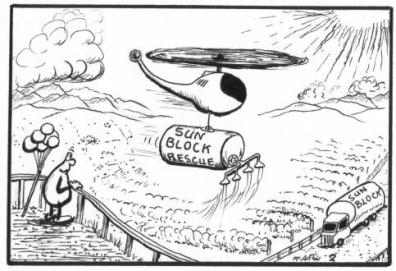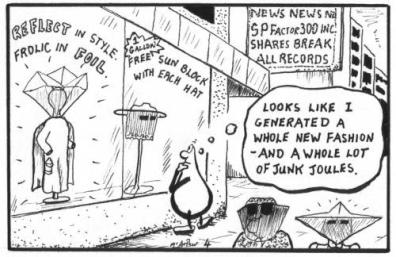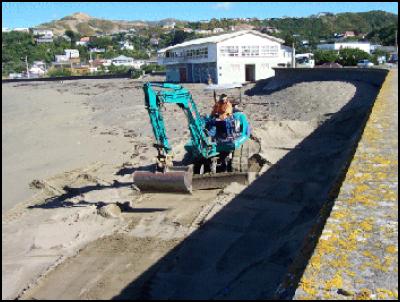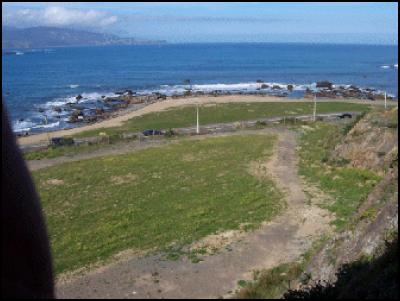Bonus Joules: The Holey Ozone Layer
The Holey Ozone Layer
Bonus Joules brightens sunlight and darkens the days of humanity with a blinding solution.
Bonusjoules Blog - 12 October 2005
Chapter 3 No 7: The Ozone Blind.

Click through to Bonus Joules Cartoon Strip
The votes are in and counted. The NZ Labour Party led by Helen Clark has the priority right to attempt to form a new government. The political options are being scoped. Around the world, oil continues to be pumped from the ground and rumours are it is increasingly sour. Where are we going to find the ideas that help keep life sweet for us?
It is possible MMP has thrown up a mixture of parties and policies that can see New Zealand through the Post Cheap Oil-Gas Age.
The final election results can be viewed at the Government site http://www.electionresults.govt.nz/
I should warn you the Government website is very confusing. It is an excellent example of how graphics can distort reality. Both National (shown as blue) and Labour (shown as red) represent a wide spectrum of opinions and a large portion of these colours overlap. It is hilarious to see both the Green Party and the ACT party painted green. Even more hilarious is painting United Future green. Its leader, Peter Dunne, has made it clear he loathes the Green Party and will not share the cabinet table with them. Indeed he goes purple at the prospect. That colour, for some reason, is what Other parties are painted as. The Maori Party shares Labour’s red and New Zealand First’s black. Labour and NZ First supported the Seabed and Foreshore legislation that inspired the genesis of the Maori Party.
In actual fact the Maori Party has far more in common with the Greens. Only the Greens and the Maori Party acknowledge the advent of the Post Cheap Oil Gas Age and attempt to address its issues and challenges issues. Indeed part of the Maori Party’s election campaign was a call for an cross-party commission to tackle the challenge. They believe the issue is so serious and urgent that it transcends party politics:
“Tariana Turia, Co-leader, Maori Party; 4 September 2005In releasing its environmental policy today, the Maori Party will announce the need to set up an urgent Cross-Party Parliamentary Commission to assess the impact of the coming peak in world oil production.”
Mind you, my weekly broadsheet, the Sunday Star Times, was even more misleading. Its pages featured the election results in the form of a large blue and red New Zealand. Perhaps it cannot understand the multi-coloured nature of our society. Perhaps, like the rich elite of New Zealand, it abhors MMP and still pines for the old two-party, gerrymandered First Past the Post system.
The SST graphics are exponentially misleading as the results are displayed by land area, not population distribution. Rural electorates tend to be relatively huge and may extend several hundred kilometres. By contrast, an urban electorate may cover five kilometers. In my last blog just before the election I saw a powerful similarity between this election and 1975 when National seats increased from 32 to 55 in that pre-MMP era. Certainly the number of National seats increased (up to 48 from 27) as I suggested they might. However this does not represent the huge movement portrayed by the SST.
This graphic, like the NZ Listener’s schismatic cover showing New Zealand ruptured in two by a yawning rural-urban chasm, fails to reflect the reality that there is no sea-change in our attitudes to the current fundamental drivers of our economy such as our addictive use of oil and Gas and the mass construction of the thermal shacks we call dwellings.
The bankers of the fossil fuel/ Bulk-electricity sector continue to rule OK.
In all, my pre-election analysis seems pretty accurate. It remains to be seen whether we resume that unsustainable Think Big path again after this “oil shock” too or whether we invest in local and community means of generating for our needs.
Please excuse me for returning to the subject of our addictive use of oil. It’s just that I figure it drives so much of our policy. We shape our country using images of everlasting cheap oil. I will give an example that Jim Sutton, ex-Member of Parliament for Aoraki, might now understand.
Jim has been New Zealand’s Minister of Agriculture and of Trade Negotiations since 1999 and of Biosecurity since 2001. Since 2004 he has been Associate Minister of Rural Affairs. He remains in Parliament because of his position on the party list. This election his majority of 7000 in Aoraki was transformed into a 6600 deficit.
I happened to tune into Nat Radio’s farming programme just at the close of Jim’s discussion of his massive loss. He offered a range of reasons but concluded by pointing to the major impact on his electorate of the school closures policy of his Government. He is probably correct that this was a dominant factor. This policy involved closing small, local schools and transporting students to larger centralised schools.
As I argued in my last blog, with the exception of the Greens and the Maori Party, our political parties remain oblivious to the fact that the Cheap Oil-Gas Age is gone. Hopefully we are moving into the Great Solar or Enlightened Age and pulling our heads out of mine holes in the earth. Hopefully we are moving to the Great Age of Conservation. Whatever, we have entered the Post Cheap Oil-Gas Age and Jim’s ministerial portfolios should have made him aware as any in Labour’s cabinet of this fact. Labour would not have even considered closing down local schools if they had been mindful of the new era we are in. Local schools are an essential part of a more energy efficient and resilient economy. Jim paid the price of our oil addiction.
The cost of our adherence to flawed images of energy hit me a couple of months ago when I attended a lecture on
“Choices, Incentives, Accountability, Professionalism: The latest Innovations in Education Reform.”
by Caroline Hoxby - Professor of Economics at Harvard University
I am interested in these visitors from Harvard as I figure they have a prime role in the administration of New Zealand. Soon after their visits we start to hear a whole strata of our politicians and media spouting their policy. Sure enough. Soon after her visit I noted Bill English, National’s spokesperson on Education, promoting the ideas of the seminar and proclaiming with renewed vigour that Bulk Funding was going to be implemented, no ifs, no buts, no maybes when he got behind the Treasury benches.
Caroline is an expert on "Achievement in Charter Schools and Regular Public Schools in the US: Understanding the Differences"
She spoke approvingly of the relative performance of Charter Schools (bulk-funded public schools). She had some good news. I liked to hear how lower decile schools have put a computer in every student’s home, made the school its homepage and communicate to parents in a range of languages. However, on the whole, the lecture reinforced my sense of the deep cynicism, defeatism and disconnect propagated by many of our Harvard advisors. Nowhere is this more apparent than in our vexed, if not hexed, electricity system. The Harvard Electricity Policy Group (HEPG) is a key guru of our Electricity Reforms.
I was pleased to note others at the seminar challenge this cynicism and question the concept that good teachers are primarily driven by monetary considerations. My observation is that some of our finest teachers are drawn to share their talents with our poorest schools. Personally I believe that if my local school is not up to scratch, then I get involved with its governing committee and work to improve it. Not one person at the seminar challenged the fundamental disconnect with transport costs. As with so many of these visiting lecturers, their “freedom of choice” theories assume our use of oil and Gas is cost free. The extra motorways required to accommodate the great slop of students back and forth across our towns and cities each school day “just happen”.
Jim Sutton was probably correct when he ascribed “religious’ and “moral” factors as having relatively little impact on his election results. He was getting close to the cause of his electorate’s unease when he spoke of his Government’s school closures. The education rational for their closure is very debatable. Tiny schools in New Zealand have produced some of our greatest scientists such as Ernest Rutherford (“Father of the Atom”) and William Pickering (“Father of Solar System”). Local schools form the nuclei of their communities.
What their closure reveals is ignorance of the value and nature of the blessed gifts of oil and Gas. Jim, with all his portfolios involving food production, trade and biosecurity, should be acutely aware of them. However I find I am unable to recall many signs that he is mindful of the extraordinary role these resources play in present agricultural production and consumption.

Click through to Bonus Joules Cartoon Strip
Jim is not aided by magazines like the NZ Listener. Its cover, (Sept 24) entitled “Pump Action”, features a distressed man with a petrol pump nozzle pointed at his head like a gun. Its interview with the CEO of the NZ Refining Company reveals a stark lack of concern for the next generation of humans. His main concern seems to be that he has a career that survives till he can retire on superanuation. He scoffs at Club of Rome predictions, oblivious to the fact that many millions of us restricted ourselves to one or no children and reduced our oil consumption dramatically as result of them. Humanity's prospects would be far worse without those predictions.
The article was entirely devoted to the impact of oil prices on motorists. A subsequent issue featured a letter by Heather Staley, the CEO of EECA congratulating the Listener:
“The cover story about peak oil covered the issues well…”
This focus on transport is myopic and reveals little regard of the real impact of depleted oil reserves on our 6.5 billion people. The effect on private motoring is of minor concern and affects just a minority of us.
Think of how oil and Gas are used to bolster our failing soil reserves, to pump water for irrigation, to store and transport food and to cook. Witness the new levels of poverty and civil instability emerging fuel costs rise in many areas of the world. Areas like the Indian continent are anticipating hyperinflation for many millions of families as Gas price-rises impact on cooking costs. Enhanced oil costs are having a major impact on the health and wellbeing of households in neighbouring countries like Indonesia and the Philippines.
Jim should know how our use oil and Gas reserves as though they are an unlimited resource plus our population expansion combine to threaten biosecurity and increase the risks of pandemics. He should know the risks of moving the same foods between countries just to keep traders happy is wasteful of oil and Gas and is a dangerous practice. Check out these unsustainable trades:
“The UK is a net importer of food. Yet at the same time there are often simultaneous exports of precisely the same products between exactly the same countries. The absurdity of this “food swap” is illustrated by the fact that in 1998, Britain imported 61,400 tonnes of poultry meat from the Netherlands, in the same year that it exported 33,100 tonnes of poultry meat to the Netherlands. Britain imported 240,000 tonnes of pork and 125,000 tonnes of lamb while it exported 195,000 tonnes of pork and 102,000 tonnes of lamb. In 1997, 126 million litres of liquid milk was imported and at the same time 270 million litres of milk was exported. 23,000 tonnes of milk powder were imported, whilst 153,000 tonnes were exported.”
Think that ridiculous? Well, New Zealand has one of the finest climates for growing apples in the world. A good NZ apple is a privilege and delight to eat. Now our apple growers are clamouring for a $NZ4 million Government subsidy to destroy 2 million trees. Already we import the floury balls of mush that are Californian apples. Soon we will be wasting even more oil carting apples from distant places like China and Chile too.
Jim should know that if a country like China or India were today to adopt our trade practices and our use of oil, then remaining global reserves of sweet oil could not last a decade. In fact we would be embroiled in a global war of unprecedented ferocity "by Christmas".
Maybe Jim was in there, thumping his fist on the cabinet table and arguing that the school closures are a needless waste of incredibly precious resources. Maybe his colleagues could not understand him. Or maybe he was surrounded by officials that protected him from the horrible reality that oil reserves are not infinite and that we use them in an addictive way.
That last thought about our officials is a real possibility. It is school holidays, that time when I really get down on my hands and knees with the stale piss and stripping fumes in my job as school janitor. It also means I can take the occasional evening off and relax with a light seminar or two.
Last week I attended a meeting at the Wellington City Council chambers to hear the how the Greater Wellington Regional Council intends to spend $3.4 billion on transport in the next decade. Hugh Barr stood up and asked the obvious question “What is the oil price of oil your proposals are based on?”. The GWRC spokeperson answered, “2002 oil prices”. To his credit he looked a bit sheepish and requested we not laugh.
It reminded me of my experience at a similar transport expenditure meeting a couple of years ago when I stood up and suggested the exercise was a bit meaningless as they were based on MED predictions of $19US a barrel. I inspired some incredulity and derision when I predicted prices would be over $40 a barrel in 2005.
Just to make a real night out of it and to share my delicate aromas of heavy grade detergent and industrial gloves more widely, I cut the meeting at the council and raced to another one up at Victoria University
“Peak Oil: Economic, Political and Environmental ImpactsThe rapid rise in price of oil is either discounted as a temporary aberration by some, or seen as a portent of the Apocalypse by others. Have we, in fact, come off Hubbert’s peak – has the demand for oil outstripped the supply? Is the Age of Oil over? If so, how will this impact our economy? Are alternative energy sources viable? What is the connection between peak oil and global warming?
Professor Bob Lloyd (Geology, Otago) will present his paper The End of Oil, in which he evaluates doomsday pronouncements, optimistic shibboleths and hard statistical data. Dr Brian Easton (Economist) will respond by looking at the political and economic implications both globally and for New Zealand.”
This looked to be an epic drama better than TV - The Geologists versus the Economists. The former deal with finite quantities of the planet Earth, the latter deal with the infinite quantities of The Market. The drama is intense: Reality Island with an economist – will the Market prevail and the sole cocoanut tree be chopped down to make the economy grow faster and maintain Market Confidence till the next quarterly statement? Will technology save us and enable us to replace that tree with a mechanical one? Get it wrong and, bing, there goes civilisation as we know it.

Click through to Bonus Joules Cartoon Strip
Anyway the speakers’ papers are apparently going to be published on the Chaplain’s webpage sometime.
Till then, check out ASPO (the Association for the Study of Peak Oil and Gas). That sums up the geologist’s argument pretty well. Oil reserves are very finite, sweet oil reserves are even more finite and remaining stocks will cost more to extract – heaps more.
And the economist’s argument? I deeply appreciate Brian Easton’s writings. I rate and respect him as one of our most thoughtful and wide ranging economists. Even he was unable to make sense of current Economics to me. He observed we are becoming aware that oil is a finite resource, just as with aging we become more aware our parents are not immortal. He is correct to point out Peak Oil does not mean oil will run out tomorrow. Already increasing millions, if not billions, of humans can no longer afford to use existing reserves. Oil has already effectively run out for them.
However his belief that present prices are just a spike begs huge questions. Like, if demand falls because oil dependent economies crash, then how good are the economics underpinning them? If demand falls because people begin to meet their needs from other resources such as the sun’s waves and new work patterns, it means we will have altered all the fundamentals underpinning the present discipline of Economics. The new GNP Growth definition will, for instance, include a person who stays warm and healthy by using the sun instead of fossil fuels. What drove such changes? Not present economic theory.
Current Economics has proved unhelpful in either case. In fact, when you think about it, our current ideas of economics sure are pretty peculiar. Economists argue finite price limits affect consumption of a resource and trigger reductions in demand. At the same time they assume the resource is infinite. The same behaviour can continue forever. Its all seems rather daft to me. It’s a bit like imagining traveling at the speed of light. As the rate of the oil spikes speed up, economic logic gets heavier and heavier till time stands still as in eternity.
I guess modern Economics cannot cope with the paradox that if we value oil highly, then its market price can drop without destroying the economy. If we put a low value on it, as we do, then we end up with high oil prices and quickly consume remaining stocks, if we are not stricken by a massive economic implosion first.
I look to a new Economics. I believe that common sense and love will sustain us – more people will start to say “I am going to only use oil and Gas based products that underpin the essentials such as our food, health, medicine, dwelling and communication systems so my grandchildren can afford those basics too.” It is possible. I am thinking of the large number of voters who were not enticed by the bright, shiny, election leaflets that urged us to “get back your share of the $7 billion surplus and fly to Australia for every game… travel the world…caribbean cruise …buy a new car…” and to tick the blue party.
In the new Economics, building to the sun will be seen to make for a healthy society and not be condemned as “GNP destroying” as it is now. Boat and rail travel will become the new cool, as well a useful mechanism for controlling pandemics.
As I write (October 6) the US oil addiction is taking a further toll on the American people. Under the cheerful byline A Doozie of a Recession (By Stephen Pizzo, News for Real. Posted October 5, 2005. )I read
“The percentage of overdue US credit card accounts jumped to a record in the second quarter as gasoline prices surged, the American Bankers Association said. Consumers had more trouble making payments on personal, auto and home-equity loans during the three-month span, the bankers group said. Delinquencies on these loans, collectively, rose to 2.22 percent from a revised 2.03 percent in the prior quarter, the group said. Delinquencies on home-equity loans increased to 2.75 percent of all such loans, up from a revised 2.61 percent. Delinquency rates for indirect auto loans, which are made by auto dealers and held by banks, increased to 2.08 percent from 1.87 percent the previous quarter. Those for direct auto loans gained to 2.07 percent from 2.04 percent.”
Two more US airlines went bankrupt last week, adding to the considerable insolvency list there now
“Just When Airlines Thought Things Couldn't Get Worse
By MICHELINE MAYNARD
Published: September 23, 2005In April, the chief executive of Southwest Airlines, Gary C. Kelly, asked employees to prepare a business plan based on oil prices at a level then unimaginable: $55 a barrel. Little did Mr. Kelly know that his nightmare price then would be welcome now.”
Our children may look back and cheer but shareholders of GM and Ford were probably not made happy as the companies dipped further into junk status last month. Industry-wide sales of large SUVs are down 43% in September from a year earlier, according to Ward’s AutoInfoBank.
For a quick read in how not to approach the challenges we face, check out George versus Jimmy. It is a comparison of the current administration’s “conservation programme” with the Jimmy Carter’s oil use policy after the "oil shocks" of the 1970s.
The article does not point out that the US would not need to import a single gallon of Iraqi or Saudi oil now if the the SUV loophole in Carters energy efficiency legislation did not exist. The US fleet would have averaged 35 mpg last year. Instead it barely averaged 20mpg, the lowest efficiency since 1981.This proves faith that technology will counter human stupidity is very misplaced.
The article is also interesting as it reveals some of the genesis of the Energy Gobbledygook that blights our society. It no doubt hampered Jimmy Carter’s ability to communicate sustainable visions too.
In Britain, Gordon Brown may be more enlightened and is perhaps beginning to see the dark at the end of the oil well.
Brown blames oil as he trims UK growth forecastsGordon Brown was last night forced into a politically embarrassing admission that UK growth this year will fail to meet his forecast as he blamed a 1970s-style oil shock for blowing the economy off course.
Six months after he publicly lambasted the International Monetary Fund for doubting his confidence that Britain would grow by 3-3.5% in 2005, the chancellor dropped a heavy hint that his new forecast would be in line with the IMF's at about 2%.
At the end of the Vic Uni meeting, Brian or Bob or both suggested that Government officials are more informed about Peak Oil now. I put my hand up and said I had just come from a meeting at the Wellington City Council where regional transport expenditure is based on 2002 prices. I asked what advice we should give the GWRC in upcoming submissions? My news was received in kind of stunned silence and neither speaker ventured to make a suggestion. So ended the meeting.
So as this new Government shakes down and susses out its options I have a few suggestions to make. It was great to hear and read Trevor Mallard’s announcement last week:
“There will be no more school closures or mergers unless boards of trustees or the Education Review Office ask for them, caretaker Education Minister Trevor Mallard says.A moratorium on the controversial school reviews, which was to have expired in 2008, would be extended "indefinitely" under a Labour-led government, he told primary school teachers at their union conference in Wellington yesterday”
Here's hoping this is because of new insights gained in his recent, brief capacity as Minister of Energy.

Click through to Bonus Joules Cartoon Strip
I will pick up on just one comment I made earlier. I referred to our dwellings as “thermal shacks. This is because they rate as some of the most energy inefficient in the developed world and are the result of spec-driven, boom bust activity often associated with Labour administrations since the 1960s. (It is 13°C in this room as I write at 11am on a mid-spring day and I have a heater on. Council-endorsed extensions to my neighbour's house seven years ago destroyed much of my home's generating capacity.)
Already Government policies since 1990 have resulted in an unprecedented drop of home affordability for young people. Inflation for them is often a thousand dollars a week against their weekly take home pay of maybe $450. It is not a nice feeling. It’s a gorilla on the back of young families.
This week Centre for Housing Research is calling for the construction of an additional 20,000 houses in the next ten years to cope with demand. That could cost $NZ100s of billion under our present regime. It could cost maybe $50 billion for the construction of the buildings and $100 billions extra to pay the heating and cooling bills. Much of the profits from the resultant Bulk-electricity and Gas sales generated by our shonky thermal design will go overseas.
Yesterday I was told of a nearby destructment (destructive development) in Wellington – a house has been bulldozed to build five 3-storey flats. The neighbouring household is understandably upset. Their home loses access to all the benefits of the solar influx the house has enjoyed for nearly a century. The flats are being built in a North-South line so now we will have 5 households living in the shadows. Junkjoules companies must be drooling at the prospects.
I find it stupid enough when garages dominate the northern aspect of a dwelling. At least when garages become redundant, the house can be adapted to the Solar Age. But when solar potential is destroyed for a century just for obsolete car drives and quick spec bucks, I feel positively crook for our children.
So lets start protecting our urban generating capacity. The new Building Code must be based on maximisation of our solar potential.
Also lets conserve oil and other precious resources and stop the daft practice of trashing our roads and our people by carting truckloads of pine logs for hundreds of miles over mountain ranges to our ports to get $30 lousy bucks per ton for them (One ton was described to me as a log a meter in diameter and 2.5 meters long). Instead let us convert them into cheap ply and batons so we can double clad our dwellings so they have high-yield thermal and moisture barriers.
And while we are at it, we must bin Leanne Dalziel’s ill-conceived anti-DIYer legislation. It is a major obstacle for some many reasons to improved building standards and sustainable practice.
One last thought for how we can adapt to the Post Cheap Oil-Gas Age: Remember, even if the Market spot price goes down for a short period, the risk of a serious environmental price still remains very high. I am pretty passionate about the oceans, as any visitor to the bonusjoules website can see from the Life on Cook Strait photos.
I have been looking at how we can future-proof the proposed Aquarium of New Zealand on the South Wellington Coast. I figure the proposed site sends some pretty negative messages and generates needless junkjoules. In short, the site works directly against the education objectives of the project.
Tell your friends who are interested in Environmental Education to check it out. I suggest a more appropriate site for the proposed Wellington Marine Education Centre/Aquarium of New Zealand.
I explore the impact of the education resource using quite a unique strategy. They might find it useful for evaluating education resources of all kinds. For those who like photos, I also have a photo essay exploring the impact of our oil-addicted, spec-driven Wellington City Council on our landscape. As always, be mindful the study is still in a draft state.
Finally for those not used to the cartoon sometimes published throughout this blog, I should explain it was drawn a couple of years ago. This chapter explores the myths and metaphors that Scientists use. Using a theme of holes, I am attempting to show how the “greenhouse” metaphor of the atmosphere thoroughly confuses communication of climate issues.
Air in the region of the “ozone layer” is warmer than the air immediately below it and this reduces the transfer of thermal energy in the form of Earth’s infrared radiation back out into space. If it gets a bit too warm in a greenhouse, you open a ceiling vent. When Bonus Joules applies the same logic to the atmosphere and makes a large hole in the “ozone layer” we find life on Earth is not so simple.
Maybe, you like me, know and sense our atmosphere as a kinetic and organic region of great flux and composed of many and varied layers of gases and temperatures. Maybe you too have trouble making sense of the images of rigidity and stasis generated by the Greenhouse model of Earth's atmosphere. If so, imagine how the use of the "greenhouse" symbol screws our kids. The symbol makes teaching the "ozone" layer needlessly impossible.

Click here to see Wellington City Council destroying our coast

Click for big
version
… and here for pictures of the
alternative site for the Aquarium of New
Zealand.


 DC Harding: In The Spirit Of Natural Justice
DC Harding: In The Spirit Of Natural Justice Martin LeFevre - Meditations: Animal Encounters During Meditative States
Martin LeFevre - Meditations: Animal Encounters During Meditative States Ian Powell: Gisborne Hospital Senior Doctors Strike Highlights Important Health System Issues
Ian Powell: Gisborne Hospital Senior Doctors Strike Highlights Important Health System Issues Keith Rankin: Who, Neither Politician Nor Monarch, Executed 100,000 Civilians In A Single Night?
Keith Rankin: Who, Neither Politician Nor Monarch, Executed 100,000 Civilians In A Single Night? Eugene Doyle: Writing In The Time Of Genocide
Eugene Doyle: Writing In The Time Of Genocide Gordon Campbell: On Wealth Taxes And Capital Flight
Gordon Campbell: On Wealth Taxes And Capital Flight